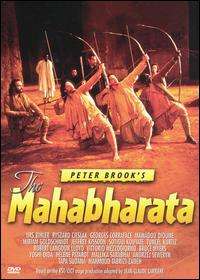The Mahabharata (1989 film)
| The Mahabharata | |
|---|---|
 DVD cover | |
| Directed by | Peter Brook |
| Written by |
Peter Brook Jean-Claude Carrière Marie-Hélène Estienne |
| Starring |
Robert Langton-Lloyd Antonin Stahly-Vishwanadan Bruce Myers Vittorio Mezzogiorno Andrzej Seweryn Georges Corraface |
| Music by |
Toshi Tsuchitori Rabindranath Tagore |
| Cinematography | William Lubtchansky |
Release dates | 1989 |
Running time | 318 / 171 min. |
| Country | Belgium / Australia / U.S.A. / Sweden / Portugal / Norway / Netherlands / Japan / Ireland / Iceland / Finland / Denmark / U.K. / France |
| Language | English |
| Budget | $5 million |
The Mahabharata is a 1989 film version of the Hindu epic, Mahabharata directed by Peter Brook. Brook's original 1985 stage play was 9 hours long, and toured around the world for four years. In 1989, it was reduced to under 6 hours for television (TV mini series). Later it was also reduced to about 3 hours for theatrical and DVD release. The screenplay was the result of eight years' work by Peter Brook, Jean-Claude Carrière and Marie-Hélène Estienne. For the casting an international selection of actors was intentionally chosen, to show that the nature of the Indian epic is the story of all humanity.
Plot
In general terms, the story involves epic incidents between two warring families, the Pandavas (representing the good side) and the Kauravas (representing the bad side). Both sides, being the offspring of kings and gods, fight for dominion. They have both been advised by the god Krishna to live in harmony and abstain from the bloody lust for power. Yet their fights come to threaten the very order of the Universe. The plot is framed by a dialogue between the Brahmin sage Vyasa and the Hindu deity Ganesha, and directed towards an unnamed Indian boy who comes to him inquiring about the story of the human race.
Cast
- Robert Langdon Lloyd as Vyasa
- Antonin Stahly-Vishwanadan as Boy
- Bruce Myers as Ganesha/Krishna
- Vittorio Mezzogiorno as Arjuna
- Andrzej Seweryn as Yudhishthira
- Mamadou Dioumé as Bhima
- Georges Corraface as Duryodhana
- Jean-Paul Denizon as Nakula
- Mahmoud Tabrizi-Zadeh as Sahadeva
- Mallika Sarabhai as Draupadi
- Miriam Goldschmidt as Kunti
- Ryszard Cieslak as Dhritarashtra
- Hélène Patarot as Gandhari
- Myriam Tadesse as Gandhari's servant
- Urs Bihler as Dushasana
- Lou Bihler as Young Karna
- Jeffrey Kissoon as Karna
- Maurice Bénichou as Kitchaka
- Yoshi Oida as Drona
- Sotigui Kouyaté as Parashurama / Bhishma
- Tuncel Kurtiz as Shakuni
- Ciarán Hinds as Ashwatthama
- Erika Alexander as Madri / Hidimbi
- Bakary Sangaré as The Sun / Rakshasa / Ghatotkacha
- Tapa Sudana as Pandu/Shiva
- Akram Khan as Ekalavya
- Nolan Hemmings as Abhimanyu
- Hapsari Hardjito as Utari (Abhimanyu's wife)
- Mas Soegeng as Virata
- Yumi Nara as Virata's wife
- Amba Bihler as Virata's daughter
- Tamsir Niane as Urvasi
- Lutfi Jakfar as Uttara
- Gisèle Hogard as 1st princess
- Julie Romanus as 2nd princess
- Abbi Patricx as Salvi
- Ken Higelin as Deathless boy
- Corinne Jaber as Amba / Sikhandin
- Joseph Kurian as Dhristadyumna
- Clément Masdongar as Gazelle
- Leela Mayor as Satyavati
- Velu Vishwananan as The hermit
Reception
The production's use of an international cast caused heated intercultural debate. Negative criticism came from Indian scholar Pradip Bhattacharya who felt that Brook's interpretation "was not a portrayal of a titanic clash between the forces of good and evil, which is the stuff of the epic... [but] the story of the warring progeny of some rustic landlord".
Awards
In 1990, the film won the award for Performing Arts of the International Emmy Awards and the Audience Award for Best Feature at the São Paulo International Film Festival.
External links
- The Mahabharata at the Internet Movie Database
- The Mahabharata at AllMovie
- The Mahabharata at miracosta.cc.ca.us
- Mahabharata film notes at web.cocc.edu
- Review of Brook's Mahabharata in Caravan Magazine